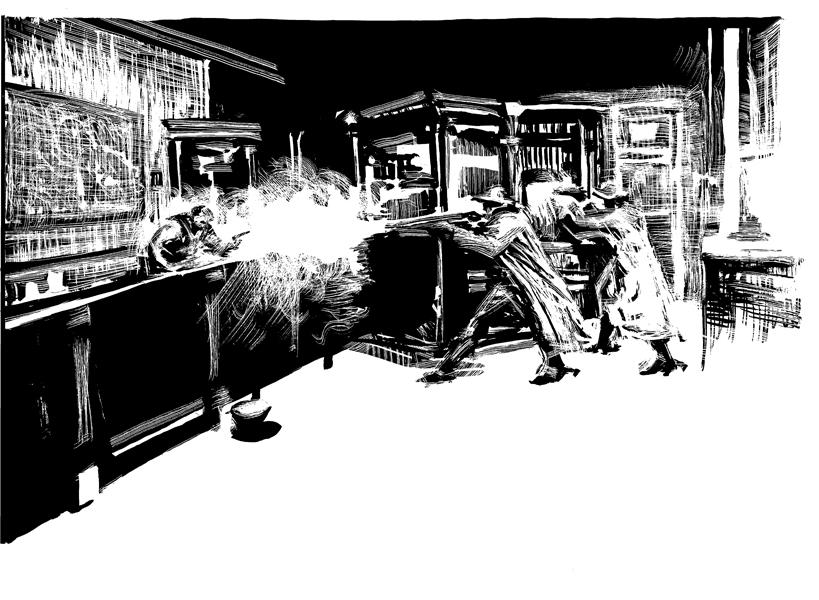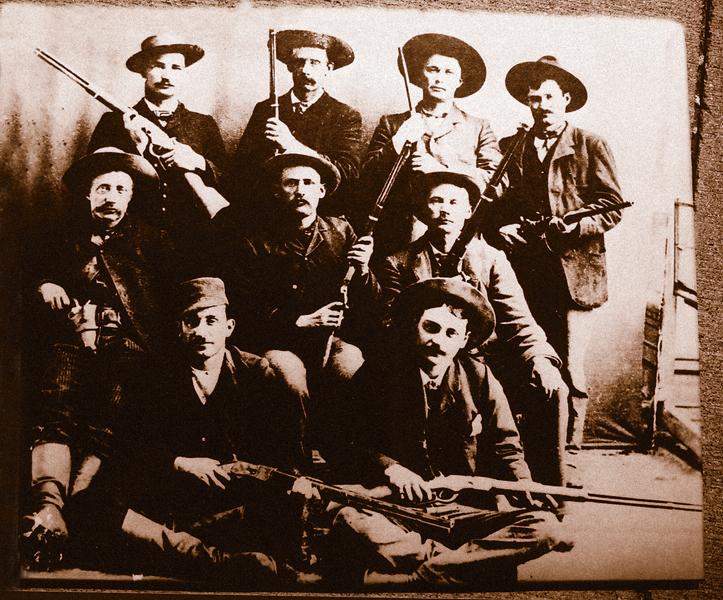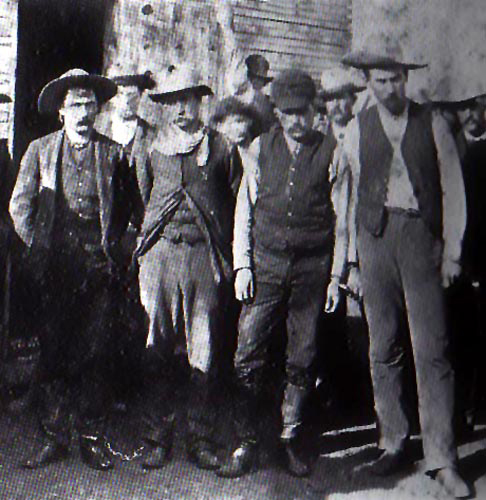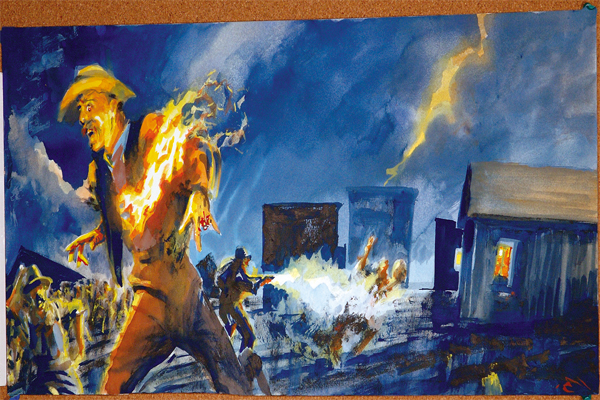
Brown
Born in Phelps County, Missouri in 1857, Brown is orphaned at a young age, and with his sister, grows up near the town of Rollo, on the farm of his Uncle Jasper and Aunt Aldamira ... and like many boys of the period, decides to head west to make his fortune when he turns 17. Landing in eastern Colorado, Brown becomes a cowboy, spends a season hunting buffalo, and eventually drifts south into the panhandle of Texas. Cowboying there, he gets into a beef with another man that Brown ends by putting three bullets in his opponent's chest. Not waiting for murder charges to be filed, he flees to New Mexico ... and is soon up to his eyeballs in what will come to be known as The Lincoln County War.
Cowboying!
In 1876, Brown begins working as a cowboy and rustler for L. G. Murphy & Co., an organization that is called "The House," is based in the town of Lincoln, and controls much of the state. At least that is the side he is on before he quits over believing he has been shorted wages, and joins up with the group opposing "The House," the "Tunstall-McSween Faction" that includes local rancher John Chisum. Sent by Chisum to help his friend John Tunstall work his ranch, and serve as a bodyguard if need be, Brown just misses the assassination of his new boss, but has his gun out and firing as a Lincoln County Regulator (along with his pal, William H. Bonney, aka, Billy the Kid) for the murders of Lincoln County Sheriff William Brady and Deputy George Hindman, the Blazer's Mill gunfight with Buckshot Roberts in which Roberts, and Regulator leader Dick Brewer, are killed, and the five day gunfight that becomes known as The Battle of Lincoln in which seven men are killed and over a dozen wounded. On a direct path to becoming a victim himself of the conflict, Brown is granted a reprieve when he leaves New Mexico (with fellow Regulators, Billy the Kid, Tom O'Folliard, Fred Waite, and John Middleton), taking a herd of rustled horses to Tascosa, Texas, and decides not to return (two murder indictments await back in New Mexico).
Tunstall's Murder
Billy The Kid
Blazer's Mill

Lincoln, New Mexico
Cowboying for George Littlefield in Texas, Brown does such a good job hunting down rustlers (an occupation he has just retired from) that he is soon hired as the deputy sheriff of Oldham County ... and then let go when he is too agressive in dealing with the region's miscreants (there are many busted skulls) ... so its back to Littlefield's ranch ... who soon gives Brown his walking papers too for the same reason. His next job is working for Barney O'Connor, the foreman of a ranch in Woods County, Oklahoma. It is there that he hears the city marshal of nearby Caldwell, Kansas, 28-year-old George Brown (no relation), has been killed trying to disarm three cowboys, so he rides into town, finds the mayor, and applies for the job ... the only party seemingly interested in trying to bring law and order to the wild area, and is instantly hired (with the classic line, "It's your funeral").

Caldwell - 1880s
A wild town like Abilene, Dodge City (the Chisholm trail meets the tracks of the Santa Fe railroad at Caldwell), and Tombstone, Brown hires a outlaw friend from Texas named Ben Robertson (while in Caldwell he will use the alias, Ben Wheeler) to be his deputy, and in almost no time at all, with a couple of shooting here (Brown kills a drunken Indian causing trouble named Spotted Horse, and when the man draws on him instead of giving up his weapon, fatally holes gambler Newt Boyce) and a few beatings there (Brown is a smallish man and leaves the fisticuffs to Robertson), peace descends on the community ... and the town loves it (in 1882 the town will give Brown a special engraved Winchester rifle with a silver medallion on the stock that reads, "Presented to City Marshal H. N. Brown For Valuable Service rendered on behalf of the Citizens of Caldwell Kas A. N. Colson Mayor Dec 1882). And loves Brown too when it discovers its tough marshal is a regular attendee of the local Methodist Church that doesn't smoke, gamble, drink, swear, or chew tobacco ... traits that allow Brown to woe and then marry the daughter of a wealthy local brick maker, 22-year-old school teacher Alice Maude Levagood (rich, good looking, and the possessor of a college degree, a rarity for women of the period).

Brown & Robertson

The Browns
A dream job, either because he needs extra cash to start a family (he has recently bought a house for his new bride) or hang with the wealthier members of town, or just loves and misses the adrenaline rush of his criminal days, Brown pisses everything away in April of 1884. Telling the mayor that they need to leave town to travel into Indian Territory to track down a murderer, Brown and Robertson leave town and meet up with two Cherokee Strip bandits named William Smith and John Wesley, and then head for the Kansas town of Medicine Lodge (a short 70 miles or so from Caldwell), where they intend to rob the Medicine Valley bank in what should be a quick and easy holdup.

Brown
Arriving in town as a spring rainstorm turns the streets to mud on a Wednesday morning, the men rein up at a coal shed behind the bank and take up their positions for the robbery ... Smith watches the horses, Robertson and Wesley enter the bank through a side door, and with his prize Winchester at the ready, Brown walks through the front door ... and the job instantly goes wrong. No customers inside, Brown tells cashier George Geppert and bank President E. W. Payne to throw up their hands. Geppert complies, but Payne doesn't and reaches for a pistol ... the wrong move, Brown mortally wounds the banker with a bullet through the man's shoulder. Wrong moves contagious, Geppert reacts to the death of his boss by slamming the door to the bank's vault shut and engaging the combination lock ... which gets him fatally shot too by both Robertson and Wesley! Money out of reach in the closed vault, two dead at their feet, citizens beginning to react to the robbery (one is O'Connor, the man Brown had worked for before moving on to Caldwell), the gunmen mount their horses and gallop south out of town ... with a posse right on their tail.

Robbery - By Bob Boze Bell
Right across from the bank, ten cowboys waiting out the storm in a livery stable before joining a cattle roundup, change plans for their day when they hear gunfire and see the outlaws riding down Kansas Avenue, and become an instant posse. Exchanging lead on horseback, the outlaws ride for the fresh mounts they have stashed in a canyon in the Gypsum Hills, but turn into the wrong canyon and trap themselves in a dead end only 40 to 30 feet deep. Making a stand there, the bandits put up a fight for two hours, but then cold and wet and almost out of ammo, the foursome surrenders ... and the citizens of Medicine Lodge discover they know all four of the desperadoes.

Some Of The Posse

Locale Of The Wrong Canyon
Brought back to Medicine Lodge as citizens line the streets yelling "HANG THEM" (it doesn't help matters either that in the escape from town, one of the bandits has shot dead a dog that was barking as the killers rode by), the four are served a meal in a local cafe, then are secured with one set of leg irons and one pair of handcuffs in a guarded log cabin. When it stops raining, they are brought outside and posed for a postcard. That done, they are given another meal and when returned to the cabin, given paper to write down any last words (Brown writes his wife, asking forgiveness and that she keep his prized Winchester, says goodbye ... and lies in telling Alice he didn't shoot anyone) ... then they wait for what all the men know is coming (and in the case of Brown and Robertson, prepare to escape, slipping out of the leg irons which have been improperly placed around the men's boots).

Posed - L to R - Wesley, Brown, Smith, and Robertson
At 9:00 in the evening, three shots ring out ... the signal for all revenge-minded citizens to meet at the cabin ... it is Lynch Party time. Waiting to run, as soon as the door to the cabin opens, Brown bursts out and runs down the street, closely followed by Robertson ... the pair doesn't get very far. In a miracle, though shot at at point blank range, Brown makes it through the crowd, only slightly wounded and makes for an open alley ... before he reaches it though, local farmer Billy Kelley unloads both barrels of his shotgun at the outlaw from only feet away, almost tearing Brown in two. Behind Brown, Wheeler is hit by bullets fired at such close range that his vest catches on fire ... a bullet rips off two fingers on his left hand, a rifle round shatters his right arm, and yet the man makes it another 100 yards down the street before even more hits finally fell him. Incredibly still alive, the mob grabs Robertson and he is taken to a nearby creek bed where a tough Elm tree awaits his, and the necks of Wesley and Smith. Asked if they have any last words, Robertson fruitless pleads for his life, Wesley requests his mother in Texas not be told of his fate, and Smith asks that his saddle be sold and the money sent to his mother, also in Texas. Goodbyes said, the three men are then hung from the Elm tree ... with Smith and Wesley sharing the same rope.

The End Of Brown & Robertson By Bob Boze Bell
After, a public auction is held for the belongings of the outlaws ... Smith's saddle goes for $10, but the others net $25 each, Wesley's grey horse nets $120 and Smith's mount reaps $123.50. Widowed only as month into her marriage, Alice will teach school in Devil's Lake, North Dakota, before becoming a nurse and superintendent of an asylum in Franfort, Indiana. In the short story she writes about her life, her only mention of Brown is that she married him in 1884, and that he "... passed away years ago." At the time of his death, Brown is 27-years-old.
No comments:
Post a Comment